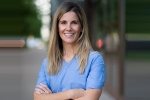Dr. Logan Interviewed by Resilient Her Blog

YT: What inspired you to pursue a career in sports medicine?
CL: My sister sustained three ACL tears, three years in a row. Each time she returned to sport, she sustained an additional rupture pretty quickly. This occurred in the early 90's when the surgical technique and rehab protocols were quite different, but being with her on this journey exposed me to the various providers she need along the way - surgeons, therapists, trainers, etc.
YT: Being both a physical therapist and an orthopedic surgeon, you have an extremely unique background and set of expertise. How has your training as a physical therapist impacted your work as an orthopedic surgeon? In hindsight, would you have directly pursued orthopedic surgery?
CL: There is a real dearth of training on rehab following surgery during orthopaedic surgery training; it is a bit of an afterthought. Similarly, in PT school, there is very little time dedicated to understanding surgical indications, technique and the perioperative process. With my combined experience I have a thorough understanding of the patient's experience, which helps me better prepare patients for recovery, set expectations, and also empathize with their path.
YT: Describe a typical week in your life as an orthopedic surgeon. How do you achieve work-life synergy? How do you take time for yourself while juggling a busy schedule?
CL: I operate on Tuesdays and Thursdays, and see patients on these opposing days. My days vary, which I like. I incorporate exercise testing into my post-operative and non-operative patient follow up, and I think this keeps my days fresh.
My first son was born when I was an intern, followed by my second as a fourth year surgery resident. Like many surgical residents, I had a handful of weeks off, then you return to your 80+ work week. Things are starting to get better, but no matter how much time you have to adjust, there is a learning curve to getting to everything that needs attention. My husband has been my partner for 21 years, and he has a busy career of his own. My advice to others is to have a plan A, B and C. Stuff happens and it is silly to think things always go as planned. Be ready, be agile.
YT: What excites you about your job? What motivates you to keep going on long, challenging days?
CL: My job is a blessing. I am grateful to take care of people who need help getting back to the life they love, and engaging in the active lifestyle of Colorado. Challenging days come for all of us. I generally reset myself and my mind with exercise. I find that when I exercise, I can work through any problem I face.







